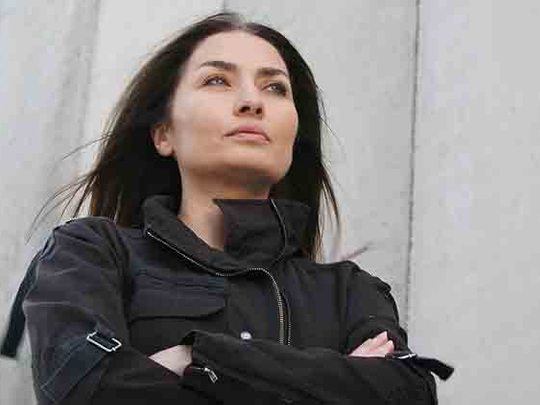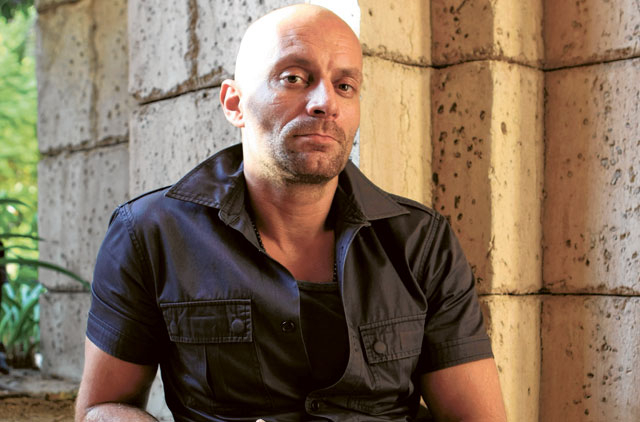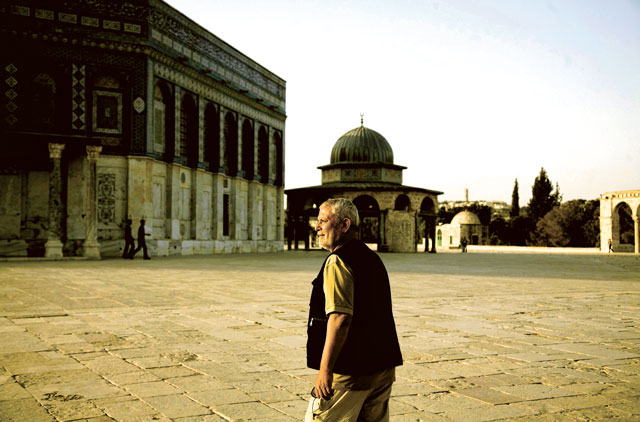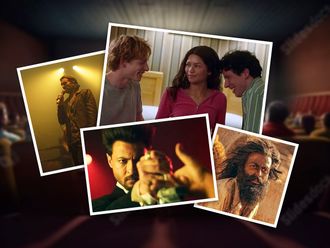
The story of Palestinian suffering has been documented by many over the decades. Year after year we are shown glimpses of what the creation of Israel in 1948 has done to the indigenous population of Palestine — be it through feature films, documentaries or interviews. Yet every now and then certain films touch us differently. They connect with the audience in such a personal way that long after watching, the film's outstanding shots are still clear in our minds. And the messages they have are so powerful that it becomes difficult to not address them or embrace them.
One of the main advantages of the Dubai International Film Festival (Diff) is that it brings together films from the region and other parts of the world, even when these films may not have been released in their respective countries or shown in cinemas. There were two films that really struck a chord for their originality and incredible personalisation of a desperately tragic setting. And perhaps unintentionally, these two films share a lot of commonalities. The first, directed by a young but very capable director, Omar Shargawi, is called My Father From Haifa. The second is The Road to Bethlehem, directed by the charismatic Leila Sansour. Both directors, half Palestinian, feel very strongly about their connections to Palestine. Young, talented and determined, they have set out to deliver their messages through a most effective medium: film.
Expulsion and its consequences
My Father From Haifa is a gripping documentary tackling a very serious and depressing topic: The consequences of the expulsion and displacement of Palestinians in 1948. Shargawi, who has already won acclaim for his first feature film Go With Peace Jamil, decides to interview his father, Munir Shargawi, about his past, after years of hearing stories from his Danish mother but never really knowing what had happened to his father, who was born in Haifa, and how his early memories impacted him. And so he takes us through a journey of heartache, from when his father recalls his early life in Palestine, to occupation and war, to moving and settling in Denmark, a place his father says was full of kind people when he arrived in the 1960s. Convincing his father to go back to the Middle East and visit his old home proves almost impossible and Shargawi's persistence and patience is almost as important in the film as Munir's difficult decision-making. Their father-son relationship is what separates this documentary from other works about the Palestinian diaspora. The audience connects with this story and cheers on the father to return to his roots.
Shargawi says he felt compelled to make this film because since the day he was born, the Palestinian case has been a big deal in his household. His father had always talked about taking him and his brothers to visit Palestine one day and Shargawi always felt that everything started in Haifa. He is realistic, though: "I never had a romantic dream that everything would be fine when we went back together." Going to Palestine for the first time wasn't an easy feat either. Shargawi's biggest fear was getting there and not feeling anything. "But I felt a lot and I feel in a strange way that my roots are all there," he says. He now goes back all the time and feels this is where he belongs.
Shargawi is half Palestinian and half Danish. He spent all his life in Denmark, where representing the Palestinian cause could have been a challenge and would have posed serious questions about his identity.
When he was younger, he says, he spent a lot of time and energy trying to convince people about the Palestinian situation and having political discussions. That is not the case any more, as he sees no point in it and prefers to concentrate on making films and speaking through them instead. "I see film as my cause. I am not making them for entertainment. I believe I have something to say, so it is better I concentrate on this," he contends, adding cheekily, "than beating people up", as in, those who don't agree with him.
Shargawi isn't always an optimist, though. While he prefers not to label himself, he is adamant that we are nowhere close to reaching a peaceful resolution in Palestine. Quizzed on the present peace negotiations, he says they are nothing but a game. "They have been going on forever and American presidents come and go and Israeli prime ministers come and go. It's just a charade and at the end of every year more Palestinian land is being carved up by Israelis."
His version of a lasting peaceful solution: a one-state solution. "Forget about the past. If they really want to build a democracy and call it whatever they want to call it, they should become one state," he says. "This is such a small country surrounded by a Muslim, Arab world, so maybe in 100 years the conflict could be resolved. And I am afraid that day might be a religious conflict," he warns. "I am always fighting not to think on those terms."
For people such as his father, whose right of return is looking less and less likely by the day, Shargawi would like to see them visit the Occupied Territories and their old homes more often. "Palestinians living outside Palestine, especially those in the West, should visit Palestine. The dream scenario is this — Palestinians go for a holiday, so Palestine doesn't turn into an idea that will vanish in the future." That is one way of being active.
Despite his blunt approach to the conflict, Shargawi is receptive to people's thoughts and feedback. He recalls an incident that occurred after his film was shown in Occupied Jerusalem.
A very old Israeli audience member, an 85-year-old woman, shaken with emotion, approached him and told him that she had recognised his father's old house from before 1948 in the film. It turns out she often played with the children of that house until they suddenly left. When she asked her mother, she was told they had gone on holiday and would return. She waited for several years before understanding what had happened.
The film also connected with the Palestinian audience in the West Bank, which was always exposed to films about Palestinians in the Occupied Territories as opposed to the experiences of Palestinian refugees in the West. The UAE audience and the Diff committee found it equally exceptional and the film was awarded the People's Choice Award and Special Jury Mention in the Muhr Arab Documentary category.
Leila Sansour, whose film The Road to Bethlehem carries a strong message of both hope and hopelessness, comes across as very focused and determined. With several critically acclaimed documentaries to her name, Sansour's latest work sets out to highlight the illegal separation wall Israel has been building for nearly a decade. (Incidentally, through this illegal wall, Israel has been redrawing borders unilaterally and from a position of power and occupation, annexing more Palestinian land and getting away with it.)
In the process, though, she is faced with incredible hurdles and out of sheer desperation, comes up with an inspiring campaign to try to save her beloved city, Bethlehem — a city which has always been open and historically diverse, which is on the verge of being forgotten. Sansour, who is half Russian, left Palestine and went to study abroad as she felt confined in the face of the Israeli occupation. After her father's death, never having lost the strong connection with her homeland, she decided to return to the West Bank to highlight Israel's illegal actions. The birth of her campaign, Open Bethlehem, is documented in the film. The campaign, a public relations initiative that speaks not only for Bethlehem but for every city in Palestine, became a film — and the film has now turned into her campaign. Sansour says she didn't face resistance with her "idealistic concept". "On the contrary," she says, "the world listens to news from Bethlehem." Like Shargawi, Sansour was always conscious of the responsibility that Palestinians have to represent their cause, especially in the United Kingdom and France, where she lived. "But it was the Second Intifada that changed everything," she says. Asked whether she feels there is enough support for her work in the community and the Middle East, she says: "The younger members of our community understand my work — and I feel a part of a more confident generation which believes it can achieve things, whether in the West or the Arab world, and use its success to fight for Palestine, among other causes."
She also has a great deal of support from the region's business leaders and social entrepreneurs who share an international outlook, such as Fadi Ghandour, Lauy Abu Ghazaleh and Bassem Shibhani.
Unlike Shargawi, though, Sansour embraces positive thinking. It could be her upbringing that has some role to play in this. She saw with her own eyes what it took to build a university under foreign occupation — Bethlehem University, founded by her father — from the difficulties in obtaining building licences to channelling funds when Palestinians were not allowed proper bank dealings. She was trained from a very young age to find constructive ways of dealing with obstacles — and there were many.
Optimistic approach
Even her outlook on the present peace talks is optimistic. She argues that Palestinians have to keep Americans engaged, for they hold the key to peace. She also says they have to keep articulating Palestinian views constructively and positively, which is one place where Bethlehem can play a role. In her view, it is very possible to bring about changes in Israeli society.
"The Palestinian National Authority often receives criticism but is now taking great steps to win recognition through diplomatic channels. And the Arab world can play a part in strengthening its authority and its goals," she says.
Sansour believes that Palestinians must remain constructive, open and articulate, for communication is half the battle. And she isn't worried about the next generation carrying the message forward. She reckons they are smarter and more confident in their achievements, whether personal or political.
So there we have it. Two very ambitious and talented Palestinian directors whose life experiences have taken them to the West and back and who have found a perfectly suitable medium to channel their thoughts about the injustices they see in Palestine. Their commitment to the cause stems not just from the fact that their fathers are Palestinian but due to their exposure to Israeli brutality. To be Palestinian is to have the identity shaped by struggle — and that comes with responsibility. There is nothing selfish about their work and, in their own way, both directors believe that without justice in Palestine there can never be lasting peace. That is the most forceful message to walk away with.













